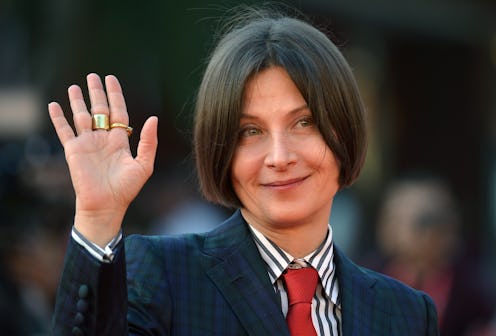Books
18 Pulitzer Prize-Winning Books by Women
On April 14, Donna Tartt’s much-anticipated and oh-so-worth-it third novel The Goldfinch was awarded the Pulitzer Prize in Fiction. (Insert applause here — and double-applause for any of you who've made it through the 784-page tome, because that thing is a commitment.)
Literary awards are often a boys' club, but there's been good news in Pulitzer-land in the last decade: Of the past ten Pulitzer Prize-winners in the fiction category, five have been women. If you're a reader of contemporary fiction, they're names you know: Jennifer Egan, Elizabeth Strout, Geraldine Brooks, Marilynne Robinson. Tartt joins some serious company, yes?
The last ten years, however, haven't been the barometer for women's success with the Pulitzer. From 1917 to 1947, the committee awarded 27 prizes in the novel category, but only 12 went to women. Edith Wharton was one of them with her now-classic The Age of Innocence. Gone with the Wind snagged a Pulitzer, too, because obviously. After 1948, the novel category was changed to “fiction” to include short story collections, though that hasn't encouraged more female winners. Sixty Pulitzer Prizes in fiction have been awarded since 1948. The final count for women fiction winners overall: 18. Ouch.
Who are these 18 women, these esteemed prizewinning authors? What are these groundbreaking, heartbreaking books? Well, since you asked...
2014: The Goldfinch by Donna Tartt
The epic tale of a bird, a boy, and a bomb.
2011: A Visit from the Goon Squad by Jennifer Egan
Not many Pulitzer Prize-winning books include a Power Point presentation inside. Goon Squad does — and it works.
2009: Olive Kitteridge by Elizabeth Strout
Retired school teacher Olive Kitteridge is the character at the center of 13 interconnected stories about troubled souls in the little town of Crosby, Maine.
2006: March by Geraldine Brooks
Australian-American author Geraldine Brooks retells Little Women from the point of view of the March girls’ father, a Civil War soldier.
2005: Gilead by Marilynne Robinson
Gilead is the eagerly-awaited second novel from Robinson, who published Housekeeping to great acclaim in 1980.
2000: Interpreter of Maladies by Jhumpa Lahiri
Lahiri’s first — and some say best — book, a collection of nine stories. It has sold more than 15 million copies around the world.
1995: The Stone Diaries by Carol Shields
Esquire calls this fictional autobiography of Daisy Goodwell Flett “a beautiful, darkly ironic novel of misunderstanding and missed opportunities."
1994: The Shipping News by E. Annie Proulx
Winner of the Pulitzer and the National Book Award, The Shipping News showcases Proulx’s distinctive prose style and gift for storytelling. To wit: “There was a month of fiery happiness. Then six kinked years of suffering.”
1992: A Thousand Acres by Jane Smiley
I remember first encountering this feminist retelling of King Lear in a college Shakespeare class. One of my classmates turned to me and said, “This is the best book I have ever read.”
1989: Breathing Lessons by Anne Tyler
Tyler was a Pulitzer finalist in ’83 for Dinner at the Homesick Restaurant and ’86 for The Accidental Tourist (my personal favorite). She finally took home the prize in ’89 for Breathing Lessons .
1988: Beloved by Toni Morrison
In 2006, A New York Times poll declared Beloved "the single best work of American fiction published in the last twenty-five years."
1985: Foreign Affairs by Alison Lurie
Alison Lurie deserves a wider audience. She won a Pulitzer, after all! (My favorite by her is Love and Friendship .)
1983: The Color Purple by Alice Walker
An intense, affecting story of a woman who learns to overcome a lifetime of hardships. The Color Purple has been adapted to the screen, stage, and radio.
1973: The Optimist's Daughter by Eudora Welty
The Optimist’s Daughter is, according to the New York Times, “a miracle of compression, the kind of book, small in scope but profound in its implications, that rewards a lifetime of work.”
1970: The Collected Stories of Jean Stafford
More than 500 pages from one of our premiere short story-writers. The collection includes the story “Children are Bored on Sundays.”
1966: The Collected Stories of Katherine Anne Porter
Porter’s previously published work — Flowering Judas ; Pale Horse, Pale Rider ; The Leaning Tower; some short stories — gets bundled up in one big book. ( Pale Horse, Pale Rider is one of 9 Classic Novellas by Women You Can Read in a Day.)
1965: The Keepers Of The House by Shirley Ann Grau
An examination of hypocrisy and racism, this unsettling novel chronicles seven generations of a family living in the same house in rural Mississippi.
1961: To Kill A Mockingbird by Harper Lee
We put a bird at the beginning of our Pulitzer list and another one at the end. This Southern Gothic classic made Harper Lee the first woman to win the fiction prize in almost 20 years.
